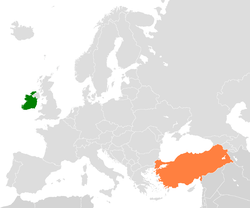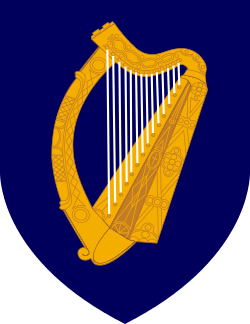Ireland–Turkey relations
 |
|
Ireland |
Turkey |
|---|---|
Diplomatic relations between the two republics of Ireland and Turkey were established in 1972. Ireland's embassy in Ankara was opened in 1998. Turkey has had an embassy in Dublin since 1973. Both countries are full members of the Council of Europe, the Organisation for Economic Co-operation and Development (OECD), the Organization for Security and Co-operation in Europe (OSCE), the Union for the Mediterranean and the World Trade Organization (WTO). Also Ireland is a member of the European Union while Turkey is a candidate.
History
During the Irish potato famine of the 1840s, Ottoman Sultan Abdülmecid donated £1,000 to famine relief. A letter written by Irish notables in the Ottoman archives explicitly thanks the Sultan for his help.[1]
According to legend,[2][3][4] the Sultan had originally intended to send £10,000, but either British diplomats or his own ministers requested that the Sultan send only £1,000, so as not to donate more than Queen Victoria, who had sent £2,000.[5] He is also said to have sent three[4] or five[6] ships full of food. The British administration allegedly attempted to block the ships, but by local tradition the food arrived secretly at Drogheda harbour and was left there by Ottoman sailors.[4][6] Shipping records relating to the port appear not to have survived. Newspaper reports suggest that ships from Thessaloniki in the Ottoman Empire sailed up the River Boyne in May 1847,[7] although it has also been claimed that the river was dry at the time.[1] In 1995, the Drogheda town hall erected a placard in commemoration. In 2012, plans were announced to produce a film on the subject,[4] starring Colin Farrell and several Turkish stars.[8]
The claim that he had wanted to give £10,000 first appears in Taylor & Mackay's Life and Times of Sir Robert Peel (1851), but the book is not referenced and no source is given. A second source, dating to 1894, is more explicit: the Irish nationalist William J. O'Neill Daunt claimed to have heard from the son of the sultan's personal physician that he "had intended to give £10,000 to the famine-stricken Irish, but was deterred by the English ambassador, Lord Cowley, as Her Majesty, who had only subscribed £1000, would have been annoyed had a foreign sovereign given a larger sum…"[9]
See also
References
- 1 2 "Abdülmecid'in İrlanda halkına yaptığı yardım 'efsane' değilmiş" (in Turkish). Zaman. Retrieved 20 May 2013.
- ↑ Kinealy, Christine (1997). "Potatoes, providence and philanthropy". In O'Sullivan, Patrick. The Meaning of the Famine. London: Leicester University Press. p. 151. ISBN 0-7185-1426-2.
According to a popular tradition, which dates back to 1853...
- ↑ Ó Gráda, Cormac (1999). Black '47 and Beyond. Princeton University Press. pp. 197–198. ISBN 0-691-01550-3.
...populist myths...
- 1 2 3 4 Akay, Latifa (29 January 2012), "Ottoman aid to the Irish to hit the big screen", Zaman,
Legend has it ...
- ↑ Christine Kinealy (2013), Charity and the Great Hunger in Ireland: The Kindness of Strangers, pp. 115, 118
- 1 2 Aymaz, Abdullah (October–December 2007), "Gratitude to the Ottomans", The Fountain Magazine (60)
- ↑ Kelly, Antoinette. "New evidence shows Turkey delivered food to Ireland during the famine". IrishCentral. Retrieved 11 July 2012.
- ↑ "CINEMA-TV - Film to depict Ottoman aid to Ireland".
- ↑ "Queen Victoria's £5: the Strange Tale of Turkish Aid to Ireland During the Great Famine". A Blast from the Past. December 29, 2014. Retrieved 2016-06-22.
External links
- Embassy of Turkey in Ireland
- Embassy of Ireland in Turkey
- Turkish Ministry of Foreign Affairs about relations with Ireland

